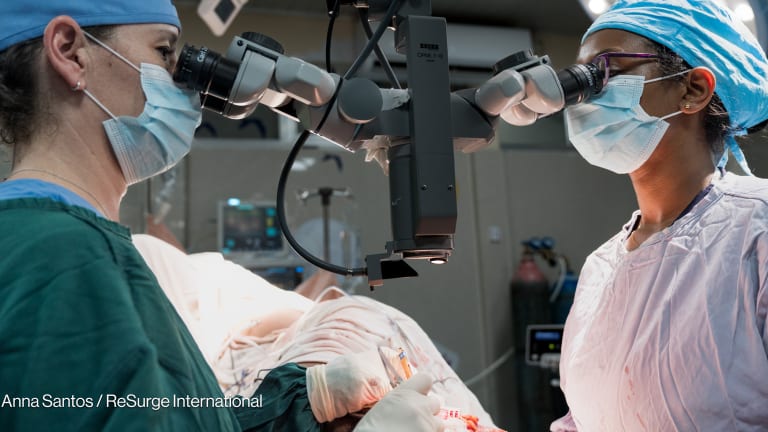
In a remote village in Kenya, Blessing and Favor, newborn twins, just completed their first follow-up appointment in the clinic where they were born a few weeks ago.
Amazingly, they are healthy, as is their mother, despite her experience with severe pre-eclampsia and cardiac arrest during delivery. What is more miraculous is that the events that saved these lives did not happen in the delivery room of a world-renowned medical center. They occurred in a district clinic in Kijabe, Kenya.
When the international community discusses how to address Millennium Development Goals 4 and 5, increasing maternal health and reducing infant mortality, lack of access to properly administered anesthesia is rarely part of the conversation. Yet in sub-Saharan Africa, improperly administered anesthesia, or complete lack of anesthesia, is one of the top four causes of death in rural hospitals among maternal patients during labor. In fact, the shortage of anesthesia providers to assist during deliveries has exacerbated the issue of maternal and infant mortality.
Access to proper care can support life-saving surgeries such as cesarian sections, and mitigate maternal hemorrhage, which is the number one cause of mortality in obstetrical patients. In general, patients in developed areas of the world can assume access to safe and properly administered anesthesia, a basic service not available on a global scale. Although access to safe anesthesia is crucial to lowering maternal mortality rates, as in the case of the twins and their mother, only 6 percent of maternal wards in Africa have access.
The burden of disease, disability and mortality that could be averted by safe surgery in Kenya and other developing nations is growing. Often, these countries lack the essential infrastructure to meet this issue head on. The World Journal of Surgery reported in 2010 that only 13 of approximately 120 anesthesiologists in Kenya work in public hospitals. The remainder are in private practice in Nairobi, with few working in the rural areas. It is estimated that in rural areas, there is only one anesthesiologist for every 13 surgeons.
Without access to safe anesthesia, maternal and infant mortality cannot be eliminated. That is why the General Electric Foundation joined with partners including Vanderbilt University, Assist International and the Kenyan Ministry of Health to create the Improving Perioperative & Anesthetic Care Training Africa program. ImPACT Africa is a sustainable training program that aims to significantly lower surgical and obstetric mortality by improving and expanding education of anesthesia providers in Kenya. The program is training nurse anesthetists to safely administer anesthesia and help fill this dire gap in skills in developing markets.
The GE Foundation is pleased to expand the work of this program through a new commitment with the Clinton Global Initiative, building on these key learnings:
● Collaboration is a “need to have” not a “nice to have.” In order to significantly improve maternal and infant health globally, we need to address health systems improvement holistically. We need to move from isolated equipment donations, financial contributions, and siloed capacity building to look at fully integrated programs that enable health systems in the long term. All players in the global community — corporations, foundations, academic institutions, nongovernmental organizations and governments — need to act together to implement meaningful, sustainable change at the local level. Partnerships with local ministries and communities are particularly critical to gaining an understanding of the unique needs of each region.
● Replicable programming. The ImPACT program is based on the “train the trainer” model. The best students coming out of the program will become “trainers” for the next generation, enabling a far-reaching, scalable impact that addresses each stage of perioperative care in a comprehensive manner. The program will develop trainers in each hospital who participates so additional training can be replicated in the most rural hospitals in western Kenya.
● Building skills builds capacity. Building technical and clinical skills and equipping health facilities with the right technology can build capacity — sustaining impact for years to come. The Center for Public Health and Development focuses on strengthening capacity in the public health system in sub-Saharan Africa through practical skills building, combining local capacity with global knowledge to empower public health sector workers and improving health care through new technology. Collaborating with ministries of health, academic institutions and local communities to build skills through in-country training ensures sustainable improvements and local ownership.
● Supporting and sustaining women helps economic stability. This training program includes developing professionals in the field of health care, specifically anesthesia care, who will then become leaders in their hospitals and the national health care structure. Typically over 50 percent of each graduating class is female and these women will be empowered with additional skills and knowledge to prompt significant improvements in anesthesia care. The vast majority of these graduates will work in rural hospitals, and go on to train the next generation of female anesthesia care providers to care for women located in their geographical area of impact. The skills this program offers will significantly affect women and will provide economic stability for the providers and potential patients, because of longer life expectancy with improved maternal care.
Lack of access to quality health care remains a global problem, but progress is being made. Innovation, alongside active partnerships, leadership and accountability across all players, can drive positive change for mothers and infants around the world.
Join the Devex community and access more in-depth analysis, breaking news and business advice — and a host of other services — on international development, humanitarian aid and global health.








